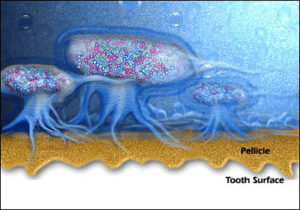
You probably make sure that you brush your teeth twice a day, and you might even floss your teeth once per day. But do you understand why practicing this daily dental hygiene routine is so important? The answer: is biofilm. Dr. James Fondriest, a Lake Forest, IL, dentist, wants you to learn about dental biofilm so that you can understand why proper daily hygiene is so important.
What Is Dental Biofilm?
Dental biofilm is composed of multiple layers of bacteria. Biofilm formation is a continuous, repetitive process. The first layer of bacteria to attach to the tissues of the mouth are Streptococcus and Actinomyces, both non-pathogenic and, in fact, beneficial to our gums.
Even though the first bacteria to attach are helpful, when you leave biofilm on your teeth, this allows subsequent, more harmful, bacteria to cling to your teeth and gums. Especially harmful is the last layer of bacteria, the layer that leads to periodontitis (severe gum disease). Even though these bacteria are always present in your mouth, they only become harmful after they attach to your gums.
Gum disease allows for bacteria released into the bloodstream
Dental plaque biofilm is the main cause of gum disease. As the bacteria break the attachment of the gums from the teeth. This opens direct communication with the bloodstream. Bacteria released into the bloodstream is called bacteremia. Beyond gum disease, invasive surgical procedures also introduce bacteria into your system. It is thought that many dental procedures cause bacteremia. Health problems ranging from heart disease, stroke, and impotence, to dementia and diabetes have been linked to bacteria being released into the bloodstream. Endocarditis is a serious heart infection caused by bacteremia. Patients with heart valve issues or recently placed artificial joints need to be pre-medicated.
How Can Brushing Your Teeth Affect Biofilm Formation?
Brushing those bad bacteria away prevents them from causing damage. Only after between three and 12 weeks do the harmful bacteria to become the dominant bacteria in your mouth. Once the bad bacteria become dominant, periodontitis can form, particularly in genetically susceptible people.
Proper, daily brushing of the teeth and gums forces the biofilm process to repeatedly restart, allowing the good bacteria to spend more time to remain attached to your gums and preventing the bad bacteria from dominating. Children and adults benefit from dental fluoride treatments.
Now that you understand how good oral hygiene can prevent gum disease and protect your dental health. Dr. Fondriest can also help you defend your oral health by providing regular dental checkups and cleanings. Call Lake Forest Dental Arts today at 847.234.0517 for your appointment. Our Lake Forest, IL, dental practice provides quality dental care for patients in the North Shore and greater Chicago areas.
